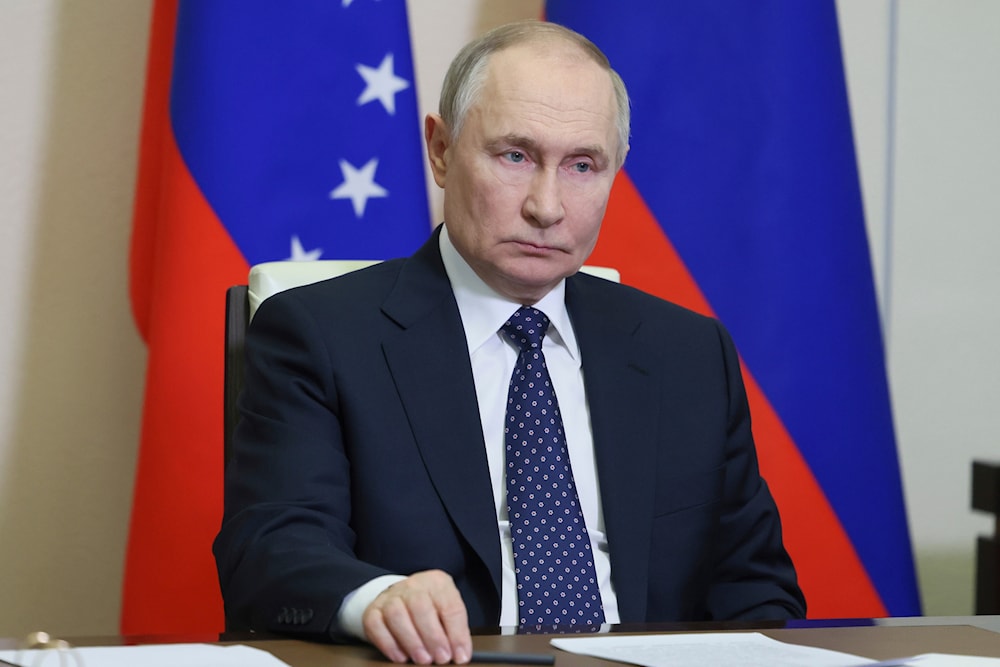Russia now views Britain as 'number 1 enemy' as tensions with US thaw
The tensions between Russia and Britain are escalating, following the latter's efforts to bolster support for Ukraine through the "Coalition of the Willing" and rallying Europe to stand with Kiev.
-

Russian President Vladimir Putin listens to Venezuela's President Nicolas Maduro during their talks via videoconference at the Novo-Ogaryovo state residence outside Moscow, Russia, on Friday, March 14, 2025 (AP)
Russia now views Britain as its primary enemy, Reuters reported, citing three Russian officials speaking on the condition of anonymity.
This title was reportedly earned after two British diplomats were expelled from the country over espionage charges, a ferocious statement from Russia's SVR calling Britain "a warmonger", and a threat from a top ally of Vladimir Putin to seize UK assets inside Russia.
The three Russian officials confirmed that Russia now views Britain as its "public enemy number 1," describing the UK as the main driving force behind the West's opposition to Russia, while another expressed his anger accusing London of "stoking chaos and war" in Ukraine, according to Reuters.
One official accused London of leading the efforts against Russia in Ukraine, describing the UK as "the locomotive" that pulls others along with it.
"London today, like on the eve of both World Wars of the last century, is acting as the main global 'warmonger'," Russia's Foreign Intelligence service said in a statement published on Monday, accusing the UK of trying to derail Trump's efforts to bring the Russo-Ukraine war to an end.
Despite Britain being a popular destination for Russian investments following the collapse of the Soviet Union in 1991, the distrust between the two countries has roots dating back to the Crimean War in 1853, where the British kingdom played a role in Russia's defeat.
Some lawmakers argued that companies from "hostile" nations like Britain should either be barred from returning even if Western sanctions are eased after an eventual peace deal with Ukraine or face stricter conditions if they do.
Meanwhile, this week, Vyacheslav Volodin, a key Putin ally, spoke of the need to reclaim funds from the UK, referring to the interest accrued on $26 billion in frozen Russian assets that London transferred to Ukraine.
British Prime Minister Keir Starmer has sparked anger among senior Russian politicians after he talked about potentially sending British troops and jets to Ukraine as part of a peacekeeping force, in addition to hosting his "coalition of the willing" meeting, further fueling the tensions between Moscow and London.
The "Coalition of the Willing", an initiative led by Britain and France in a bid to bring the war in Ukraine to an end, has been rejected by Russia, who has been in talks with the United States regarding a halt to the war in Ukraine ongoing for 3 years.
Starmer emphasized on March 3 that the coalition would be part of a wider effort that includes continued military aid for Ukraine and supporting Kiev in defending itself after the war is concluded.
Russia and the United Kingdom have been facing a diplomatic row, following tit-for-tat expulsions that have reduced the number of staff in the British embassy by 10 employees at the very least, while the Russian embassy follows suit with its own set of expulsions.
Tensions between Russia, UK escalate
On March 10, Russia's FSB announced the expulsion of two individuals linked to the British Embassy in Moscow, accusing them of espionage and threatening national security.
The FSB identified the individuals as Alkesh Odedra, a second secretary at the British Embassy, and Michael Skinner, the husband of Tabasum Rashid, a first secretary in the political department, adding that Odedra and Skinner provided inaccurate details when they applied for entry permits to Russia.
The UK government quickly responded on March 12 by expelling a Russian diplomat and their spouse in response to accusations that Moscow is harassing British diplomatic staff, a move that followed the UK Foreign Office summoning the Russian ambassador to protest what it described as a coordinated campaign of intimidation against its embassy personnel.
The Russian Federal Security Bureau previously withdrew the accreditation of six British diplomats in Moscow, accusing them of engaging in espionage and sobtage and working to escalate the military situation in Russia, pointing that "the facts revealed give grounds to consider the activities of British diplomats sent to Moscow by the directorate as threatening the security of the Russian Federation."
Another point of contention could likely be the UK government's attempt at creating a new intelligence-sharing subgroup within the Five Eyes alliance in response to US President Donald Trump cutting intelligence sharing with Ukraine only to be resumed shortly after.

 4 Min Read
4 Min Read









